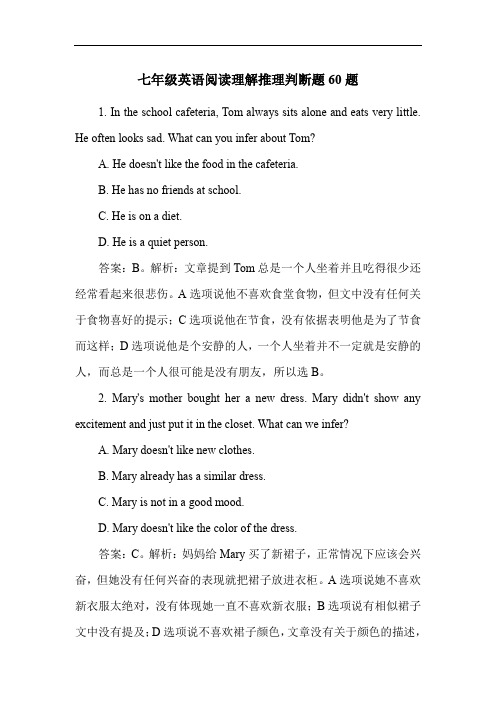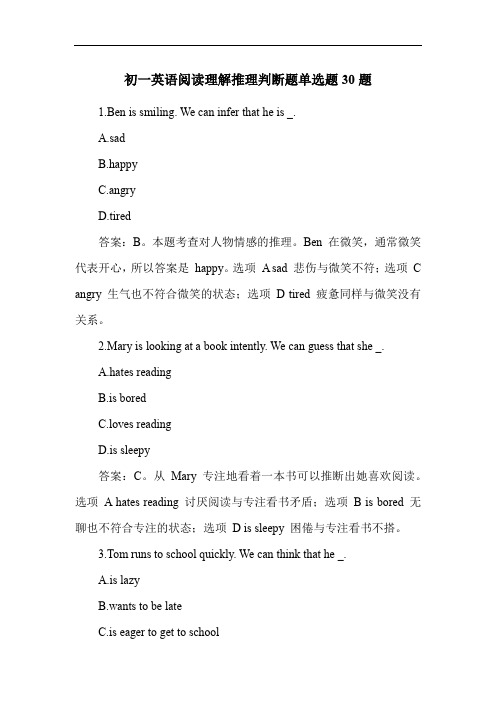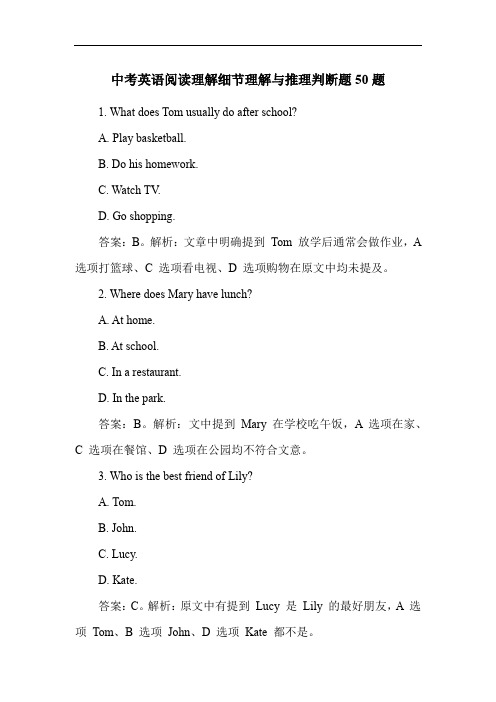初中英语阅读理解精讲精练之推理判断题
七年级英语阅读理解推理判断题60题

七年级英语阅读理解推理判断题60题1. In the school cafeteria, Tom always sits alone and eats very little. He often looks sad. What can you infer about Tom?A. He doesn't like the food in the cafeteria.B. He has no friends at school.C. He is on a diet.D. He is a quiet person.答案:B。
解析:文章提到Tom总是一个人坐着并且吃得很少还经常看起来很悲伤。
A选项说他不喜欢食堂食物,但文中没有任何关于食物喜好的提示;C选项说他在节食,没有依据表明他是为了节食而这样;D选项说他是个安静的人,一个人坐着并不一定就是安静的人,而总是一个人很可能是没有朋友,所以选B。
2. Mary's mother bought her a new dress. Mary didn't show any excitement and just put it in the closet. What can we infer?A. Mary doesn't like new clothes.B. Mary already has a similar dress.C. Mary is not in a good mood.D. Mary doesn't like the color of the dress.答案:C。
解析:妈妈给Mary买了新裙子,正常情况下应该会兴奋,但她没有任何兴奋的表现就把裙子放进衣柜。
A选项说她不喜欢新衣服太绝对,没有体现她一直不喜欢新衣服;B选项说有相似裙子文中没有提及;D选项说不喜欢裙子颜色,文章没有关于颜色的描述,很可能是她当时心情不好,所以选C。
英语阅读理解推理判断题

英语阅读理解推理判断题推理判断题是英语阅读理解的一个重要题型,属于深层次理解类试题,要求考生在理解原文字面意义的基础上,通过对语篇逻辑关系及细节分析,进行推理和判断,从而得出文章的深层意义和隐含意义。
推理判断题分为细节推断题(如人物性格特征,事件因果),观点态度推断题,意图目的推断题,文章出处推断题及下文内容推断题等。
一、推理判断题常见的设题方式1. 在推理判断题题干中常含有表示“表明,暗示,推论“的词汇,即以infer, imply, suggest, conclude, indicate, learn , intend, mean, show , describe , purpose , attitude , tone等词提问。
From the text , it can be inferred /concluded that _________.The author implies /suggests /indicates _________.We can learn from the passage __________.The author mentions his experience to show that ________.The main purpose of the text is to _______.The author’s attitude toward ……. is ________.The tone of the passage can best be described as ________.2. 提问中含有表推测的情态动词,如can ,could ,might ,would , should 等和其它表示可能性的词,如probably , most likely , seem等。
Where would this passage most probably appear?The text is most likely a part of ________.The text is most probably taken from _______.The author seems to believe that _________.二、推理判断题的解题方法1. 细节推理判断题英语阅读理解的细节推理判断题要求考生根据语篇内容,推断具体细节,如时间、地点、人物关系、人物身份、事件等。
优选初中英语阅读理解精讲精练之推理判断题.docx

第三推理判断一、推理判断出方式【型】1.推理:直接推理,正确是由文中的某具体信息直接推倒出来的。
2.推理:需要就文中所提供的多信息行合,推出新的。
【形式】1.Which of the following is (not) mentioned in the paragraph2.What can we infer from the last sentence3. What do you think would happ en (to⋯) at the end of the story4.We can learn from the last paragraph that _________.5.We can infer from the passage that __________.6.From this passage, we can infer that __________.7.From the passage, we know that __________.8.The writer believes that ___________.二、 4 招巧解推理判断第 1 招:根据干中的关在原文中定位某些推理判断往往也文中的事或而置,因此也可以根据干中的人物、地点、、述象等关在原文中定位,然后根据原文内容行正确的推理和判断。
示例 1The man left with no hope at all. He didn ’t know what to do with only $10 in his pocket. Hethought and thought. Then he went to the supermarket and bought 10 kilos of tomatoes. He sold the tomatoes from door to door. In less than two hours, he had 20 dollars. He repeated the operationthree times, and started to go early every day, and returned homelate. Shortly,he bought a cart, then a truck, then he had his own fleet ofdelivery vehicles ( 运货车队 ). Five years later, the man was one of thebiggest food retailers ( 零售商 ) in the US.49.Why could the man become one of the biggest food retailers in theUSA.Because he had many friends to help him.B.Because he was smart and worked very hard.C.Because he had his own fleet of delivery vehicles.D.Because he wanted to show Microsoft he was living.第 2 招:不要试图在原文中直接寻找答案推理判断题的答案,是根据文中的细节或局部内容推理得出的,是文中细节内容隐含的深层次含义,因此不可能在原文中直接找到对应的陈述。
初一英语阅读理解推理判断题单选题30题

初一英语阅读理解推理判断题单选题30题1.Ben is smiling. We can infer that he is _.A.sadB.happyC.angryD.tired答案:B。
本题考查对人物情感的推理。
Ben 在微笑,通常微笑代表开心,所以答案是happy。
选项 A sad 悲伤与微笑不符;选项C angry 生气也不符合微笑的状态;选项D tired 疲惫同样与微笑没有关系。
2.Mary is looking at a book intently. We can guess that she _.A.hates readingB.is boredC.loves readingD.is sleepy答案:C。
从Mary 专注地看着一本书可以推断出她喜欢阅读。
选项 A hates reading 讨厌阅读与专注看书矛盾;选项B is bored 无聊也不符合专注的状态;选项D is sleepy 困倦与专注看书不搭。
3.Tom runs to school quickly. We can think that he _.A.is lazyB.wants to be lateC.is eager to get to schoolD.doesn't like school答案:C。
Tom 快速地跑向学校,可以推断出他渴望到学校。
选项 A is lazy 懒惰与快速跑向学校相反;选项B wants to be late 想迟到也不符合快速跑的行为;选项D doesn't like school 不喜欢学校也不会快速跑向学校。
4.Lisa is helping her classmates. We can know that she is _.A.selfishB.meanC.kindD.cruel答案:C。
Lisa 在帮助同学,可以知道她很善良。
选项A selfish 自私与帮助同学相悖;选项B mean 吝啬、不友好也不符合帮助同学的行为;选项D cruel 残忍更不符合。
中考英语-阅读理解-推理判断题解题指导

阅读理解之推理判断题解题指导推理判断题着重考查学生归纳概括、逻辑推理等综合能力, 要求考生根据文章表面的文字信息, 推断出作者没有提到的或者没有明说的事实或隐含信息。
这类题目旨在考查考生透过词语的字面意义去理解作者的言外之意的能力, 属于深层理解题。
考生在做此类题目时, 应尽量考虑文中全部信息或事实, 在通篇理解文章的基础上, 运用逻辑思维, 借助一定的常识, 做出正确的推理和判断。
一、推理判断题常见提问方式1.The writer / author / passage implies / suggests (暗示) that ________.2.It can be inferred (推断)from the story that ________.3.We can learn from the passage that ________.4.The passage is intended to ________.5.The first paragraph of this passage is to ________.6.From the passage, we can learn / conclude that ________.7.The passage may be a / an ________.8.How does the author seem to feel about this issue?9.Which of the following might happen later?10.Which of the following can be concluded from this passage?二、选项特点分析推理判断题目选项的设置有一定的特点和规律, 了解这些, 可以帮助提高答题的正确率。
1. 正确选项的特点:(1)正确选项一般含义比较丰富, 具有一定的综合性和概括性;(2)正确选项的表述一般不会太绝对, 而是会用一些相对宽泛的词汇, 如often, usually, sometimes, some, may, might, can, could, possibly, probably等;(3)正确选项有时候与通过常识判断得出的结论相反, 要特别注意。
中考英语阅读理解细节理解与推理判断题50题

中考英语阅读理解细节理解与推理判断题50题1. What does Tom usually do after school?A. Play basketball.B. Do his homework.C. Watch TV.D. Go shopping.答案:B。
解析:文章中明确提到Tom 放学后通常会做作业,A 选项打篮球、C 选项看电视、D 选项购物在原文中均未提及。
2. Where does Mary have lunch?A. At home.B. At school.C. In a restaurant.D. In the park.答案:B。
解析:文中提到Mary 在学校吃午饭,A 选项在家、C 选项在餐馆、D 选项在公园均不符合文意。
3. Who is the best friend of Lily?A. Tom.B. John.C. Lucy.D. Kate.答案:C。
解析:原文中有提到Lucy 是Lily 的最好朋友,A 选项Tom、B 选项John、D 选项Kate 都不是。
4. How many students are there in the class?A. 30.B. 40.C. 50.D. 60.答案:A。
解析:文中明确说班级里有30 个学生,B 选项40、C 选项50、D 选项60 均错误。
5. What color is the teacher's dress?A. Red.B. Blue.C. Green.D. White.答案:B。
解析:原文提到老师的裙子是蓝色的,A 选项红色、C 选项绿色、D 选项白色都不符合原文描述。
6. We know that the Earth goes around the Sun. But which planet is the closest to the Earth?A. Mars.B. Venus.C. Mercury.D. Jupiter.答案:B。
中考英语复习之考题精练 阅读理解--主旨大意题、推理判断题

基础自查
考点汇聚
随堂演练
课后作业
Part Two
基础自查
考点汇聚
随堂演练
课后作业
主要透过文章表面信息推测文章隐含意思或对 作者的态度意图及文章细节的发展做出推理判断。
① The passage / author implies/ suggests that
② It can be inferred from the text that___.
Q: From Para.3, we learn that Thomas was _______.
A. sad
B. optimistic C. ambitious
D. grateful
基础自查
考点汇聚
随堂演练
课后作业
Planning a visit to the UK? Here we help with ways to cut your costs.
A. the future of print books is controlled by readers. B. digital books will take the place of print ones soon. C. paperless libraries and the traditional ones should coexist(共存). D. people will lose their interest in reading books in the future.
A. Cigarette smoking can cause cancer B. Smoking can cause the most serious and terrible disease (illness) C. Smoking also can cause other health problems D. Smoking is harmful.
初中英语阅读理解精讲精练之推理判断题(20200514000234)

第三节推理判断题一、推理判断题出题方式【设题类型】1. 细节推理:直接推理,正确选项是由文中的某处具体信息直接推倒出来的。
2. 归纳推理:需要就文中所提供的多处信息进行归纳综合,推导出新的结论。
【设问形式】1. Which of the following is (not) mentioned in the paragraph?2. What can we infer from the last sentence?3. What do you think would ha ppen (to …) at the end of the story?4. We can learn from the last paragraph that _________.5. We can infer from the passage that __________.6. From this passage, we can infer that __________.7. From the passage, we know that __________.8. The writer believes that ___________.二、4招巧解推理判断题第1招:根据题干中的关键词在原文中定位某些推理判断题往往也针对文中的事实或细节而设置,因此也可以根据题干中的人物、地点、时间、陈述对象等关键词语在原文中定位,然后根据原文内容进行正确的推理和判断。
示例1The man left with no hope at all. He didn’t know what to do with only $10 in his pocket. He t hought and thought. Then he went to the supermarket and bought 10 kilos of tomatoes. He sold the tomatoes from door to door. In less than two hours, he had 20 dollars. He repeated the operationthree times, and started to go early every day, and returned home l ate. Shortly, he bought a cart, then a truck, then he had his own fleet ofdelivery vehicles (运货车队). Five years later, the man was one of the biggest food retailers (零售商) in the US.49. Why could the man become one of the biggest food retailers in theUS?A. Because he had many friends to help him.B. Because he was smart and worked very hard.C. Because he had his own fleet of delivery vehicles.D. Because he wanted to show Microsoft he was living.第2招:不要试图在原文中直接寻找答案推理判断题的答案,是根据文中的细节或局部内容推理得出的,是文中细节内容隐含的深层次含义,因此不可能在原文中直接找到对应的陈述。
- 1、下载文档前请自行甄别文档内容的完整性,平台不提供额外的编辑、内容补充、找答案等附加服务。
- 2、"仅部分预览"的文档,不可在线预览部分如存在完整性等问题,可反馈申请退款(可完整预览的文档不适用该条件!)。
- 3、如文档侵犯您的权益,请联系客服反馈,我们会尽快为您处理(人工客服工作时间:9:00-18:30)。
第三节推理判断题一、推理判断题出题方式【设题类型】1. 细节推理:直接推理,正确选项是由文中的某处具体信息直接推倒出来的。
2. 归纳推理:需要就文中所提供的多处信息进行归纳综合,推导出新的结论。
【设问形式】1. Which of the following is (not) mentioned in the paragraph?2. What can we infer from the last sentence?3. What do you think would ha ppen (to …) at the end of the story?4. We can learn from the last paragraph that _________.5. We can infer from the passage that __________.6. From this passage, we can infer that __________.7. From the passage, we know that __________.8. The writer believes that ___________.二、4招巧解推理判断题第1招:根据题干中的关键词在原文中定位某些推理判断题往往也针对文中的事实或细节而设置,因此也可以根据题干中的人物、地点、时间、陈述对象等关键词语在原文中定位,然后根据原文内容进行正确的推理和判断。
示例1The man left with no hope at all. He didn’t know what to do with only $10 in his pocket. He thought and thought. Then he went to the supermarket and bought 10 kilos of tomatoes. He sold the tomatoes from door to door. In less than two hours, he had 20 dollars. He repeated the operation three times, and started to go early every day, and returned home late. Shortly, he bought a cart, then a truck, then he had his own fleet of delivery vehicles (运货车队). Five years later, the man was one of the biggest food retailers (零售商) in the US.49. Why could the man become one of the biggest food retailers in the US?A. Because he had many friends to help him.B. Because he was smart and worked very hard.C. Because he had his own fleet of delivery vehicles.D. Because he wanted to show Microsoft he was living.第2招:不要试图在原文中直接寻找答案推理判断题的答案,是根据文中的细节或局部内容推理得出的,是文中细节内容隐含的深层次含义,因此不可能在原文中直接找到对应的陈述。
●示例2So how can you make things easier on yourself? It’s easier than you think. Just make sure your parents know what you’re doing. Get them to know your friends. Phone if you stay somewhere else so that your parents do n’t call every hospital in the phone book looking for your body. Say sorry to them when you make mistakes. Take responsibility for what you have done. Talk about your ideas with them. They may talk about theirs with you.2. The writer thinks ______________.A. it’s wrong of parents to worry about their children too muchB. some parents are unfriendly, which makes their children angryC. children should do everything as their parents sayD. parents love their children very much and the children should understand them 第3招:要有全局观念,理清上下文的逻辑关系。
有些推理判断题,虽然是针对文中的某项细节而设,但往往并不能直接从该细节中得出答案,而需要结合细节前后的内容甚至细节所在的段落内容综合推断出,因此,在解答这类题时,不要只是根据只言片语推出答案,而是要充分结合上下文。
●示例3 (2009北京C)You can set up a plan to finish homework or go to a doctor or psychologist to try to wor k things out with your family or your friends. But sometimes you can’t change a stressful situation. Sometimes you don’t even want to. A big change might be a good change, but it will still be stressful.57. From the last sentence of Paragraph 5 we can infer that ____________.A. it’s difficult to change a stressful situationB. it’s not stressful when a good change takes placeC. a big change will cause another stressful situationD. a stressful situation can’t be changed without any effort●示例4The baby eagle(鹰)fell down, faster and faster. He looked up at his mum, “Why doyou abandon me? He looked down at the earth. The ground was much closer.Then something strange happened. The air caught behind his arms and he began to fly! He wasn’t moving to the ground any more. Instead, his eyes were pointed up at the sun.“You are flying! You can make it!” His mother smiled.50. We can infer from the story that ____________.A. the baby eagle lost his motherB. the baby eagle felt down and diedC. the baby eagle could get food himselfD. the baby eagle was still angry with his mother第4招:根据主旨大意进行归纳、推理、判断●示例5As we drove from the station in the car, she began telling me a story. A few days earlier, her brother had run out of gas. A good man picked him up, took him to a service station and then back to his car. “I’m must passing the favor(善行) along,” she said.When I offered her money as a thank-you, she wouldn’t accept. “Just do something nice for somebody. Pass it along,” she said.35. The bus driver hoped that the writer ___________.A. would drive someone homeB. would help someone in needC. would keep her in memoryD. would give the money to others●练习1Mare says, “I like playing the piano because it makes me ha ve a lot of different feelings —sadness, excitement, happiness and so on. I like playing difficult pieces, especially those that my teacher says I shouldn’t.75. What Mare said in the last paragraph tells us that ________.A. Mare likes challengeB. Mare doesn’t like challengeC. Mare is afraid of challengeD. Mare hates challenge●练习2The computer is fast and hardly makes a mistake, while people are slow and make mistakes sometimes. That’s what people often say when they talk about comp uters.71. The computer can work ________ than people.A. more wonderfullyB. more slowlyC. more oftenD. harder●练习3(2011顺义期末D)Although it’s not clear that the MP3 players cause teenagers’ hearing loss, Grimes said it was still a good idea to turn down the sound and take short breaks from listening.55. About hearing loss, it can be inferred that___________.A. the reasons for the rise have been foundB. listening to loud music may be a causeC. MP3 players are to be blamed (指责) forD. noise may be the main reason●练习4(2011丰台期末C)The first rule of speaking English is to use simple vocabulary. KISS—keep it short and simple. There’s a saying in English, “Have you swallowed a dictionary?” It is applicable(适用的) to anyone who uses a long, difficult word when a shorter word will do. And there is another saying, “Practice makes perfect.” So here are some tips for speaking English.Make friends with native English speakers. Try to listen to what they say and try to repeat what you hear just as a child does. If you use English all the time as a child, you may learn it quickly. If you are not able to find any friendly native speakers where you live, you can find English speakers on the Internet! Try to talk with them about the movie s or the books you like. If you can’t find anyone who will actually help you, don’t worry. You will still be able to find out whether they can understand you.55. We can learn ____________ according to the passage.A. it is necessary to use a long, difficult word.B. experts should not join an English club.C. children can speak English better than adults.D. native speakers can help us speak English better.●练习5(2011延庆期末D)Why does a family choose to live in such a home? Well, it’s comfortable, easy to keep clean, easy to keep warm, no need to paint. What’s more, the fast increase of mobile homes in numbers has something to do with the job uncertainty. Nobody knows what will happen tomorrow. If a factory closes down, you may be trapped with the house you can’t sell. However, if you have a mobile home, you can move on easily.59. We can infer that the increase of the mobile homes shows .A. people’s hope for new jobsB. some problems in people’s lifeC. great changes in people’s living styleD. great interest in developing new things 练习6If you do not use your arms or your legs for some time, they become weak; when you start using them again, they slowly become strong again. Everybody knows that. Yet many people do not seem to know that memory works in the same way.When someone says that he has a good memory, he really means that he keeps his memory in practice by using it. When someone else says that his memory is poor, he really means that he does not give it enough chance to become strong.If a friend says that his arms and legs are weak, we know that it is his own fault (过错). But if he tells us that he has a poor memory, many of us think that his parents are to blame(责备), and few of us know that it is just his own fault.Have you ever found that some people can’t read or write but usually they have better memories? This is because they cannot read or write them down in a little notebook. They have to remember days, names, songs and stories; so their memory is the whole time being exercised.So if you want to have a good memory, learn from the people: practice remembering.1. The main reason for one’s poor memory is that ________.A. his memory is not often usedB. he does not use his arms or legs for some timeC. his father or mother may have a poor memoryD. he can’t read or write at all2. From the passage we learn that if your arms and legs are weak, ________.A. we won’t be able to use them any moreB. they will become stronger very soonC. they won’t become strong till we use them againD. that is not related to ourselves3. Which of the following is NOT true?A. Your memory works in the same way as your arms or legs.B. Writing things down will help you remember them.C. A person with a good memory must be able to read and writeD. A good memory comes from more practice.4. Some people can’t read or write, but they usually have better memories, because________.A. they have less trouble in writing thingsB. they can remember things more easilyC. they are better at learning from othersD. they have to keep their memories in more use5. Which might be the best title for this passage?A. Don’t stop using your arms or legs.B. How to have a good memory.C. How to keep your good memory.D. Reading, writing and memory.如有侵权请联系告知删除,感谢你们的配合!。
